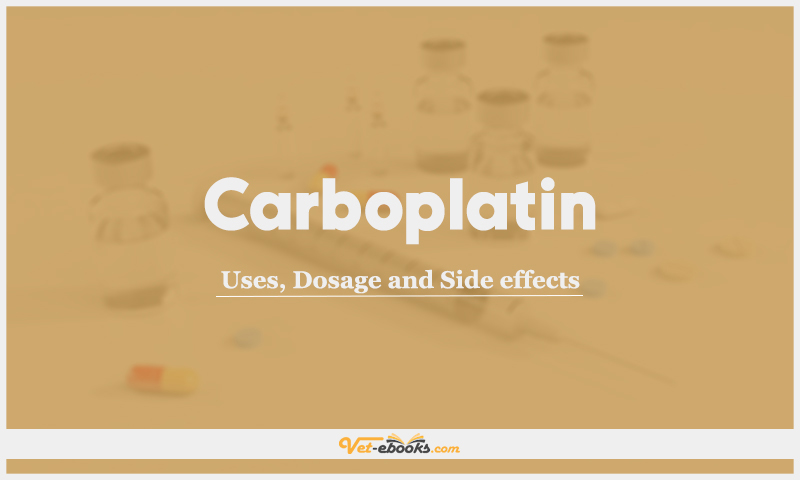Carboplatin For Dogs and Cats: Uses, Dosage and Side Effects

Overview
Carboplatin inhibits DNA synthesis and function by creating intra- and interstrand cross-links as well as DNA-protein cross-links with DNA.
Uses of Carboplatin
- Could be helpful in treating a variety of neoplastic conditions, such as thyroid adenocarcinoma, anal sac adenocarcinoma, squamous cell carcinoma, ovarian carcinoma, mediastinal carcinoma, pleural adenocarcinoma, and nasal carcinoma.
- When taken in conjunction with amputation in dogs with appendicular osteosarcoma, it increases survival rates.
Dose of Carboplatin For Dogs and Cats
Dogs:
All uses: 300 mg/m2 i.v. q3–4wk injected into the side port of a freely running i.v. infusion of 0.9% NaCl over a 10–15 min period.
Intrapleural/intraperitoneal dose: 225–300 mg/m2 diluted in 0.9% NaCl or 5% dextrose water (in one text this is diluted to 10 mg/ml then again in 1 ml per 4.5 kg body weight) over a 5–10 min period.
Cats:
All uses: 200 mg/m2 i.v. q3–4wk injected into the side port of a freely running i.v. infusion of 0.9% NaCl over a 10–15 min period.
Intrapleural/intraperitoneal dose: 200–240 mg/m2 diluted in 0.9% NaCl or 5% dextrose water over a 5–10 min period.
Drug Dosage Calculator
You Should Give:
Side Effects of Carboplatin in Dogs and Cats
- Myelosuppression, nephrotoxicity, ototoxicity, electrolyte abnormalities and neurotoxicity.
- Allergic reactions (including delayed cutaneous hypersensitivity).
- produces fewer side effects than cisplatin.
- Negative effects in cats could be unpredictable or delayed (thought to be due to GFR changes in older cats).
Contraindications of Carboplatin in Dogs and Cats
- Patients with a history of platinum hypersensitivity.
- Patients with a history of bone marrow suppression.
Some Notes:
- It is extremely irritating so, an IV catheter must be implanted before administering it.
- Avoid using i.v. sets or needles that contain aluminum because the medication may precipitate.
- It has less GI and renal damage than cisplatin so, medication is now generally preferred.
- Patients with impaired renal function, active infections, hearing impairments, or pre-existing liver illness should use this medication with caution.
- Concomitant use of aminoglycosides or other nephrotoxic agents may increase the risk of nephrotoxicity.
- May adversely affect the safety and efficacy of vaccinations.
- Potential to act as a radiosensitizer for patients receiving concomitant radiotherapy.
Do You Want To Increase Your Veterinary Knowledge and Practical Skills?
You Can Now Browse and Download +3000 Books For Veterinary Professionals & Students Online.
Download Veterinary Books




















